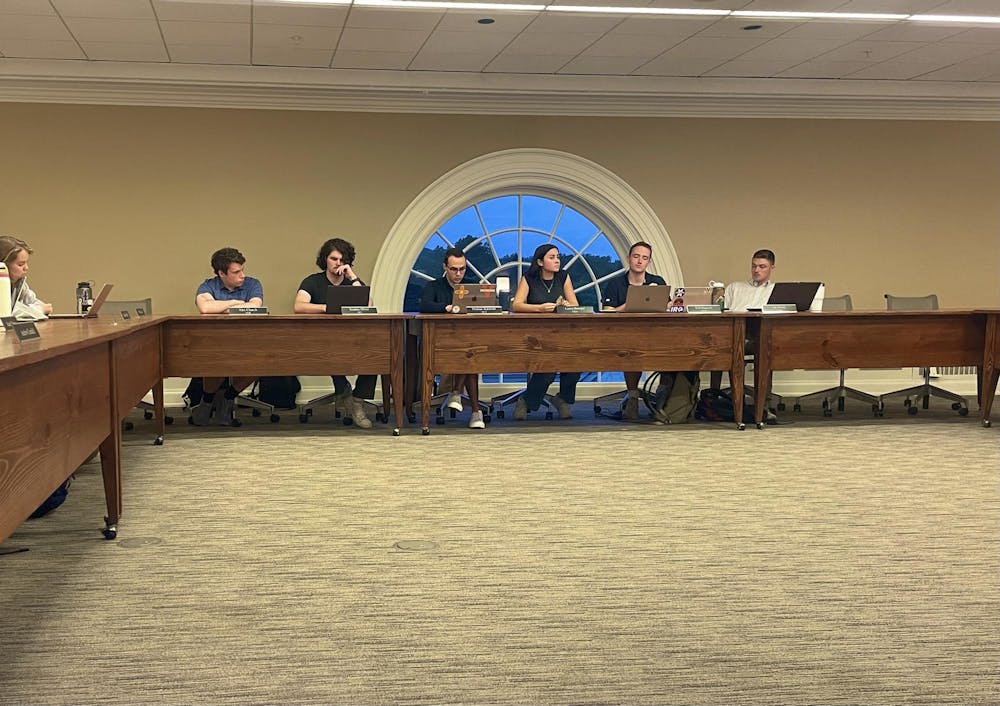The Honor Committee convened Sunday to discuss new student engagement initiatives. One suggestion introduced by Laura Howard, chair of the committee and fourth-year College student was to introduce “guest speaker sessions” during public meetings to encourage more University members to attend and share their ideas with the Committee. Howard also outlined a plan for a new opt-in newsletter that may include case summaries and general updates for students. The Committee also resumed a discussion from the previous week on how support officers can best gather feedback from reporters about Honor case-processing.
Howard introduced the “guest speaker” period for public sessions to operate in conjunction with the current procedure — a public comment period is available for any University member to speak at the beginning and end of meetings. Howard said that a guest speaker period would designate time for a speaker before the public comment session to spark conversation and potentially boost student engagement.
“The hope would be to encourage more people to come during public comment [period] and to make it more known that we really appreciate and want to hear these perspectives,” Howard said.
The Committee discussed which groups should be invited to the guest speaker sessions, and agreed on implementing a reservation system for a guest speaker period before the public comment session. Howard said that these sessions could be nomination-based — if Committee members know someone with expertise on the Committee’s affairs, they can invite them to speak at a meeting.
The purpose of the period would be to spark more community-driven discussions of the Committee and its procedure, allowing for more outside input on the Honor System and its role at the University. Following these sessions, speakers would have the opportunity to share more during the public comment period.
“We could send an invitation [or] it could be nomination based,” Howard said. “There might be a way to tie it to the content of the [meeting] … then they can participate in the conversation in real time.”
Howard also introduced a new student engagement initiative — the creation of a monthly, opt-in newsletter from the Committee. At present, the Committee does have a semesterly newsletter updating the student body on their values and procedures. Another student self-governance organization, the Student Council, has a monthly newsletter, which all student email addresses automatically receive.
“[The newsletter] could [include] official summaries from cases [or] big bylaw updates,” Howard said. “It’s a way to keep people more engaged in honor and a better understanding of it, rather than just our semester emails.”
Thomas Ackleson, vice chair for operations and third-year Engineering student, supported the idea, saying it would help increase the student body’s engagement with the Honor system. Ackleson said that the Committee can include their “Honorable Mention” link in the newsletter, which allows students to nominate friends that have acted in an honorable way.
According to the Honor website, nominations do not need to be directly related to the Committee’s core tenets, such as academic integrity and honesty, but can instead reflect any positive action that a student believes exemplifies the ideals of the Community of Trust.
“I don't think we've had any submissions on that in a very long time,” Ackleson said. “This would be a good place to highlight [the form].”
Committee members were generally supportive of the newsletter proposal during the meeting. Howard said that she would like to send out the first newsletter in early October.
The Committee also revisited a conversation from its last meeting, discussing strategies for increasing feedback on Honor procedures from people who report Honor offenses. Reporters — typically faculty members and graduate teaching assistants — are individuals who file an honor report upon witnessing potential offenses.
Howard specifically requested the Committee’s input on how to obtain more feedback from reporters on their experience navigating the case process.
“I think there's a general theme that reporters can feel frustrated that the case process takes too long or they have a variety of concerns,” Howard said. “[Are there] ways … to encourage [reporters] to share what is going well for them or what they think we should improve on?”
Seamus Oliver, vice chair for investigations and third-year College student, said that it would be helpful to have support officers gather feedback directly from reporters as they lead them through the pretrial processes. He said that the current post-hearing conferences — where the Committee reviews case outcomes — tend to focus on the hearing itself rather than the earlier stages of investigation.
To improve the process, Oliver said that the advisor representing the Community — who advocates for the reporter's perspective — could take a more proactive approach in seeking input from the reporter throughout the process.
“[Post-hearing conferences] are very hearing focused events,” Oliver said. “Sitting down with the [support officers] involved and getting a sense of the entire case … would be a time for the advisor for the community to perhaps air out any frustrations on the part of the reporter.”
Alex Church, vice chair for hearings and third-year Engineering student, said that the Committee could arrange meetings between the advisor for the community and the reporter, in case the reporter has concerns or feedback about the case process.
“A part of [improving the feedback process] might be after a case is over, having the [advisor for the community] meet with the reporter … to be able to [gather] those concerns,” Church said. “I think there is a lot of stuff that falls through the cracks.”
Committee discussions regarding case-processing feedback will continue at future meetings. The Committee will reconvene next Sunday at 7 p.m. in the trial room of Newcomb Hall.







